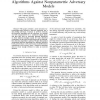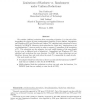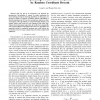1578 search results - page 44 / 316 » Algorithmic randomness of continuous functions |
132
Voted
CCA
2009
Springer
15 years 9 months ago
2009
Springer
In the theory of algorithmic randomness, several notions of random sequence are defined via a game-theoretic approach, and the notions that received most attention are perhaps Mar...
109
Voted
CISS
2007
IEEE
15 years 9 months ago
2007
IEEE
Abstract—This paper presents a novel zero-sum watermarking game between a detection algorithm and a data hiding adversary. Contrary to previous research, the detection algorithm ...
140
click to vote
JMLR
2012
13 years 5 months ago
2012
One approach to modeling structured discrete data is to describe the probability of states via an energy function and Gibbs distribution. A recurring difficulty in these models is...
111
click to vote
APPROX
2008
Springer
15 years 4 months ago
2008
Springer
We consider (uniform) reductions from computing a function f to the task of distinguishing the output of some pseudorandom generator G from uniform. Impagliazzo and Wigderson [IW]...
117
click to vote
IJCNN
2007
IEEE
15 years 9 months ago
2007
IEEE
—The 0/1 loss is an important cost function for perceptrons. Nevertheless it cannot be easily minimized by most existing perceptron learning algorithms. In this paper, we propose...



